As anyone who has read my in-depth review of Beethoven knows, family movies from the 1990s are often covert founts of darkness and despair, sometimes to the point that it is nigh impossible to see them any other way. Another great example of this curious phenomenon is the 1994 film Baby’s Day Out, which depicts a world on the brink of total destruction just underneath its deceptively cheerful surface. This is a world that no longer values anything but material possessions, social status, and unbridled hatred. If allowed to go on the way it is, this society will surely collapse on itself, as childcare, familial connections, and basic human decency are utterly neglected. Baby’s Day Out is the tale of the one super-genius infant who just might be able to save a world full of nihilistic idiots from itself.
The supernatural intelligence of the titular child (known only by the demeaning nickname “Baby Bink”) is established right away when we see that the boy can practically read. At first glance, it might appear that he is just idly looking at colorful pictures the way any infant would, but we later learn that the entire path of his day out corresponds to the journey of the fictional baby in his book, also called Baby’s Day Out. Throughout the movie, though, it appears that only Baby Bink’s nanny, Gilbertine (Cynthia Nixon), has the slightest appreciation for his true abilities, as his mother, Laraine (Lara Flynn Boyle), only cares about the potential for social climbing, and his father, Bennington (Matthew Glave), seems to barely notice he even has a child.
We are introduced to the unfortunate Baby Bink’s parents with a scene in which Laraine’s motives are made plain. “Baby Bink is almost a year old and virtually unknown,” she laments as she sees the photo of another high society baby in the newspaper. She pays lip service to the idea that she wants the world to see what a beautiful baby he is, but it’s plain he is nothing more than a photo op to her, a pawn in an ongoing game of one-upmanship with her rich friends.
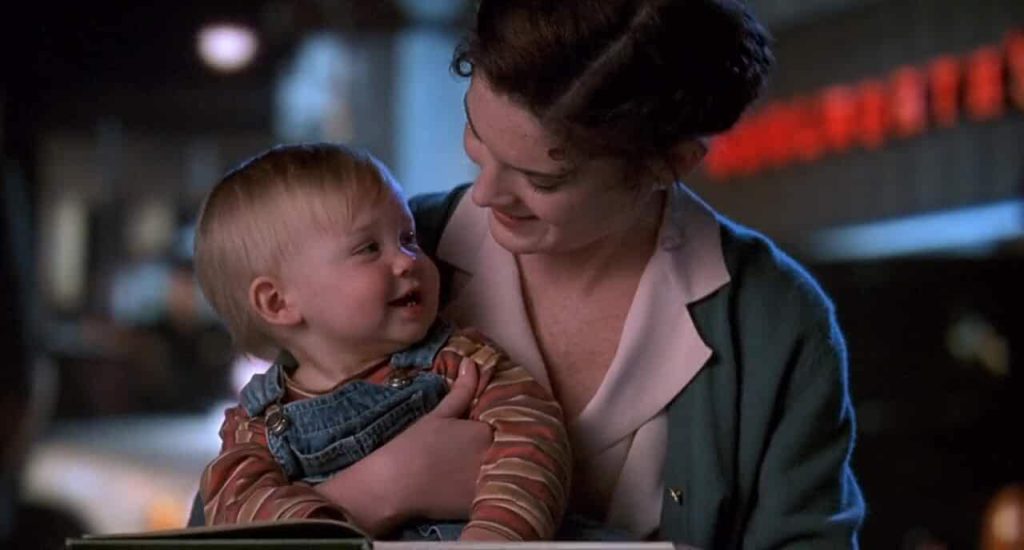
We are then introduced to the gang of kidnappers who plan to take advantage of Laraine’s vanity, providing a nice juxtaposition of equally cynical motivations. As the gang’s leader, Eddie (Joe Mantegna), puts it, “That little doo-doo machine is my retirement money.” Of course it is Laraine’s overwhelming desire to put her innocent child in the public eye that allows him to be kidnapped, as Eddie and his henchman, Norby (Joe Pantoliano), pose as photographers in order to gain access to Baby Bink. Their disguises, however, don’t hint at “professional photographer” so much as they practically scream “kidnapper.”
“I need to study his marvelous features,” Eddie tells Laraine, by way of explaining why she and Gilbertine should leave Baby Bink alone with him. “He does well with people he is not… intimate with?” is his follow-up question. He and Norby are basically cartoon caricatures of creepy kidnappers, yet only Gilbertine raises any objection to leaving a baby in their care, and this is immediately overruled by the self-absorbed Laraine. Anything to get that precious photo for the newspaper!
Once Baby Bink has been effortlessly stolen from his oblivious mother, the bad guys (there is a second henchman named Veeko, played by Brian Haley) go through the standard shenanigans inherent in not having a clue how to care for an infant. The brunt of these duties go to Norby, and his cluelessness would be expected of any such low-life character. Of course, the rest of the movie goes on to show, time and again, that pretty much everyone else in its particular world is every bit as inept, but let’s start with the colossal failings of Norby.
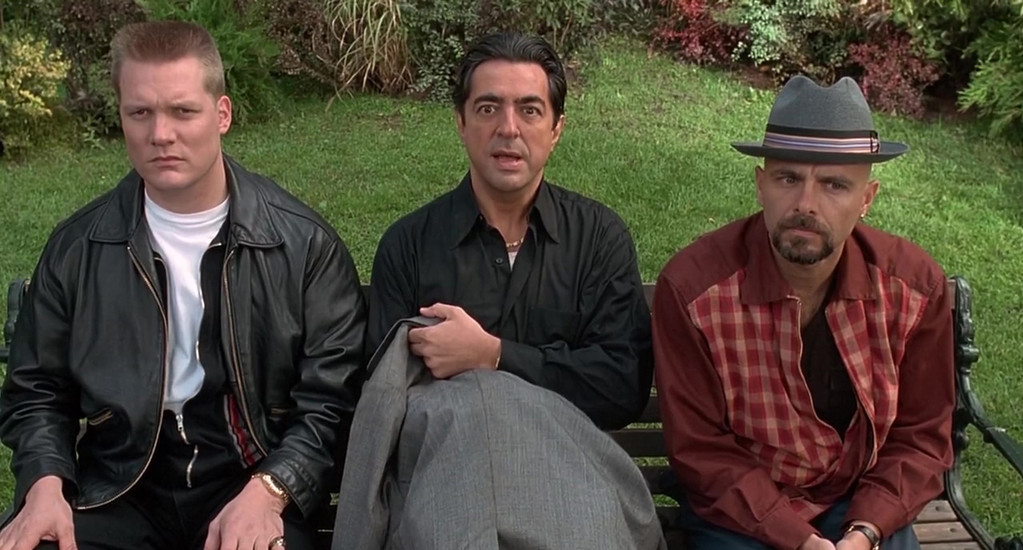
Exhausted from the strenuous diaper-changing shenanigans he just endured, Norby, who is now the only one of the three kidnappers keeping an eye on the baby, promptly falls asleep. He manages to stay that way even when Baby Bink shouts the word “Bluebird!” right next to his ear, in what can only be termed an outdoor voice. Baby Bink has just correctly identified and called by name a bird he glimpsed in the Baby’s Day Out book earlier that day; as mentioned before, the kid is not yet one year old and I’m pretty sure he can already read.
When Norby fails to wake up and see the pretty bird, this super-genius baby does what most audiences generally want to do to a Joe Pantoliano character: smacks him right upside the head. Norby continues to sleep, so Baby Bink simply crawls out the wide-open window right next to him and makes his escape. The incompetence of a squad that elects its one clearly narcoleptic member to watch their “retirement money” is our first hint that this world is plagued by a nihilism that goes far beyond the mere cynicism and materialism we’ve seen thus far.
From the fire escape outside the window, Baby Bink makes his way into a random apartment, where he goes unnoticed by the extremely grouchy old woman who lives within. Baby Bink makes his way past her when she opens the door to grudgingly admit a deliveryman, with whom she has an unnecessarily antagonistic encounter as she accepts the package he has brought her. The exchange of material goods clearly offers no solace to either of them as they continue on through the bitterness of their respective existences. Perhaps if they hadn’t failed to notice the happy baby boy crawling around unattended at their very feet, they might have felt some momentary joy, some concern for the well-being of a fellow human, some sort of emotion of any kind other than scorn and vindictiveness, but alas, that is not to be in this grim universe.
From this barren, loveless apartment building, Baby Bink then makes his way outside and somehow manages to board a city bus by himself without anyone noticing. The self-absorption and general apathy of the passengers and bus driver alike is astonishing, especially in an era long before smartphones, but that is the emotionally desolate landscape painted by this devastatingly dark John Hughes screenplay. This is Hughes in full-on violent slapstick mode, as previously seen in Home Alone, Dutch, and probably a few others he didn’t bother to direct himself; perhaps not surprisingly, one of these is the aforementioned Beethoven, written under a pseudonym.
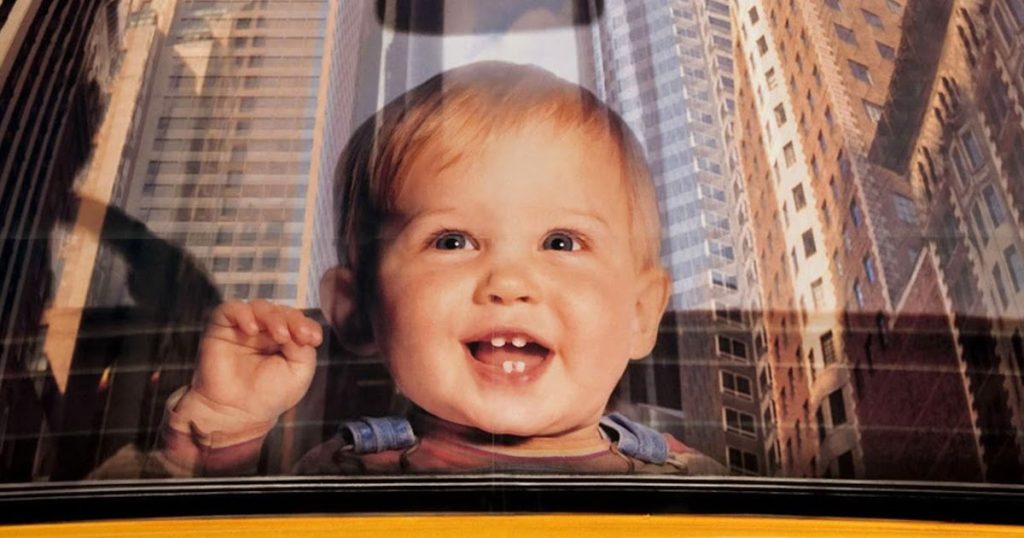
Baby Bink makes it all the way to the back of the bus undetected (or at least unremarked, due to rampant apathy) where he openly mocks his former captors, leading them to recklessly chase him through the city streets like they were Keanu Reeves in Speed or something. He then ultimately makes his way off the bus by falling into a fat lady’s purse, which is right beside her on the bus seat, and which she then carries off the bus, remaining completely oblivious to it all! At this point, mere materialism would be comforting; it is frighteningly obvious that no one in the world of this movie gives the slightest fuck about small children.
Baby Bink makes his next escape after an altercation between the bumbling bad guys and the lady in whose purse he is hitching a ride. The baddies might have actually won this altercation or, better yet, avoided it entirely if not for the hatred in the hearts of nearly every adult character in the movie. They first encounter the lady when she angrily entreats them to move their van, which is blocking her path, and Veeko replies, “If you’d limit yourself to a couple of pork roasts a day, you wouldn’t need to worry about it.” The unnecessary rudeness and contempt of all parties involved leads to an all-out brawl once the baddies realize Baby Bink is in the lady’s purse and follow her, all the while making tasteless fat jokes she can easily hear. She then mops the sidewalk with them while a large crowd watches, and still no one seems to care when an unattended infant crawls away from the scene.
This severe lack of basic human decency and empathy is sure to bring about the end of the diseased society portrayed in the film but, as always, no one seems to care much, which is made plain in the next scene. Baby Bink makes his way into a shopping center where he crawls through the feet of literally dozens of people who are all too blinded by their consumerist frenzy to even notice him. Finally, an employee of “Mother Goose Corner” (which is apparently where people dump their babies so they can better focus on the all-important shopping at hand) just halfheartedly assumes he’s one of the unfortunates entrusted to her care and brings him back to the nursery. Apparently, losing other people’s children is just something that happens all the time, and certainly not something to spend any undue time worrying about.
All this, we are reminded in the very next scene, is going on while one of the top stories on the TV news is the kidnapping and million-dollar ransom of a baby. Baby Bink, super-genius that he is, has no trouble actually escaping from Mother Goose Corner, just as his shockingly inept captor assumed he had in the first place, and then proceeds to crawl back through the feet of dozens more oblivious shoppers and out through a revolving door without being noticed. Cockroaches get more acknowledgement than this poor kid!
He then crawls through the feet of the reporter delivering the news story about his kidnapping, gets tangled in the microphone cable and pulls the live mic out of her hand. The camera operator even tilts down with her as she picks it up, getting a shot of the baby at their feet… and then they both just go right back to shooting the news segment. That baby can fend for itself, as far as either of them is concerned. The reporter even ends by saying, “Even when what they’re looking for is right under their nose,” in a winking nudge to the audience, though this sort of callous disregard for the most vulnerable members of society is far more frightening than it is cute.
Baby Bink leaves this scene by crawling into an open taxi door, where large shopping bags are loaded onto the seat immediately after him, obscuring him from the passenger’s view. This once again hints at a society blinded by materialism, and is followed by a reinforcement of the same when a “concerned neighbor” played by an uncredited Mike Starr actually calls the police with a tip… only to shake them down for money and provide useless information.
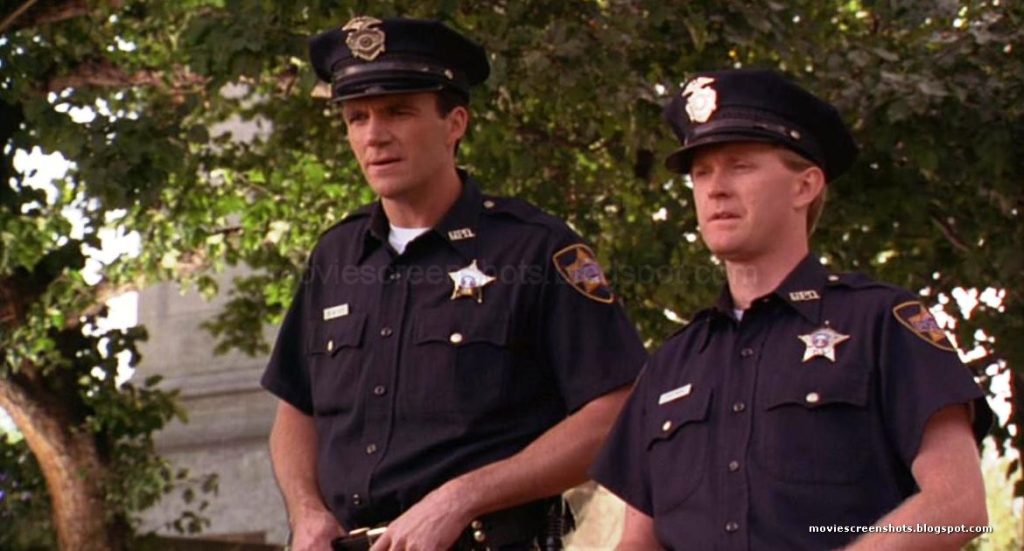
In perhaps the movie’s most harrowing moment, we meet the only other character that seems to truly care about babies, but even this has a supremely dark edge to it. The apartment indicated by Mike Starr’s “caring” neighbor belongs to a single mother raising several children on her own. This unfortunate woman is contributing to the impending apocalypse in her own way by significantly overpopulating her own home, but she claims the children are all she’s got. This is incredibly sad, and points to a dark ulterior motive in even this seemingly compassionate character; the children are a substitute for any other value she might perceive herself to have in this bleak world, filling (or at least attempting to fill) a void in her being that would otherwise remain gapingly empty. This brief moment in Baby’s Day Out is almost unbearably depressing.
To lighten the mood a bit, we return to the bad guys and their pursuit of Baby Bink. Eddie and his crew are beginning to fray around the edges at this point, going all Treasure of the Sierra Madre and arguing amongst themselves about their cuts of the purely hypothetical ransom. This presents a microcosm of the selfish, shortsighted materialism that threatens the stability of the movie’s entire world. Meanwhile, Baby Bink has managed to crawl past an entire elementary school field trip at the zoo without being noticed (how easy is it to get a teaching certificate in this world?) and, super-genius that he is, decides to employ a full-grown gorilla to do his dirty work for him. Baby Bink sits watching with an eerie smile while the gorilla clobbers the goons as they attempt to extract Baby Bink from his cage. The scene plays out almost like The Omen meets Home Alone, as Baby Bink cheerfully observes the excruciating slapstick pain inflicted on his would-be captors.
As per his picture book, Baby Bink makes his way from the zoo to a park, where he just crawls around unattended and unnoticed, as usual. One lady, with young kids of her own in a stroller, shows some half-assed concern and asks Baby Bink where his Mommy is. Baby Bink, perhaps intentionally conning the poor lady, looks over at a nearby woman reading a book, and each assumes the other is his mother, because every adult in this movie is dangerously stupid and neglectful. The lady with the stroller then just walks away, prompting not the slightest alarm from the other lady reading the book, and Baby Bink once again just crawls away to do his own thing.
Police are no less inept and unreliable than any other ostensible authority figures in this world. Even the cops who ultimately help find Baby Bink (including one played by future Republican Senator Fred Thompson, of Die Hard 2 fame) are really only in it for their own cynical ends; solving this highly publicized (yet somehow widely ignored) case makes the department look good.
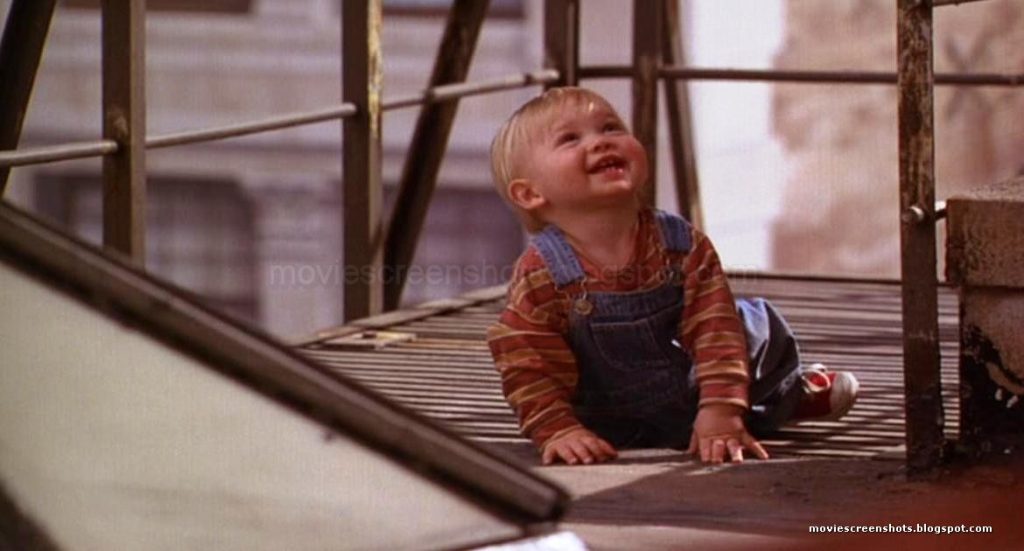
Before that can happen, though, the bad guys actually do manage to recapture Baby Bink in the park, only to be almost immediately approached by police. Eddie quickly hides the baby on his lap beneath his overcoat, which is positioned in such a way that it can only be hiding either a kidnapped baby or an act of public masturbation. Neither possibility apparently fazes the cops, as they watch Eddie squirm and twitch on the park bench while Baby Bink holds the flame of a cigarette lighter on the crotch of his pants… for a few minutes straight! This baby is either a super-genius or a straight-up demon. Either way, he possesses far more advanced motor skills (and sense of humor, as he laughs gleefully while crawling away from the scene of his crotch-arson) than the average infant.
The final showdown takes place after Baby Bink manages to wander into a construction site, where sparks fly everywhere amidst all sorts of heavy, dangerous machinery, and (surprise, surprise) not a single man on-site notices him. They are all, presumably, far too busy with the all-important duties of Industry. One of them even drives a bulldozer directly over the spot where Baby Bink sits heedlessly in the dirt, as if he’s used to flattening small children on the job on such a regular basis that he can’t even be bothered to notice if the damn thing’s not even under the wheels, fer Chrissake!

The remainder of this climactic setpiece is basically just fifteen minutes or so of bone-crunching violence offset by a jaunty score and the joyful giggles of a small child. It’s wonderful.
Needing to tie everything up and end the movie, we are informed via the police that someone at each of the stops along Baby Bink’s adventure path has in fact called the police to report seeing an unattended baby (yeah, right), but apparently each of these do-gooders decided that was more than enough, and then just let the baby continue to be on his own. As the cops read a list of locations, Gilbertine realizes that Baby Bink (super-genius that he is) has been following the structure of his picture book, and that she therefore knows where to find him. She, the parents, and the police then ultimately find him at a nursing home, surrounded by old folks who look like they’re being interrupted in the middle of entering a new vessel, Being John Malkovich-style. It’s a mildly creepy moment, but nothing compared to the nihilistic nightmare that has come before. On the ride home, Baby Bink pulls a Lassie and leads the police to the bad guys’ lair in search of the book he left behind there.
By the end of the movie, the bad guys are absolutely terrified of Baby Bink and, based on all we have seen, we should be, too. We can only hope this infant Einstein will use his extraordinary mental abilities to save a society on the brink of total collapse due to its own blind materialism and apathy; to use them for good instead of evil, in other words. If not, the total destruction of society, and perhaps even the extinction of the human race, is sure to come. We should also thank whatever leper messiahs to whom we still semi-ironically pray that the inevitably racist sequel suggested in the final scene (Baby’s Trip to China) was never made.